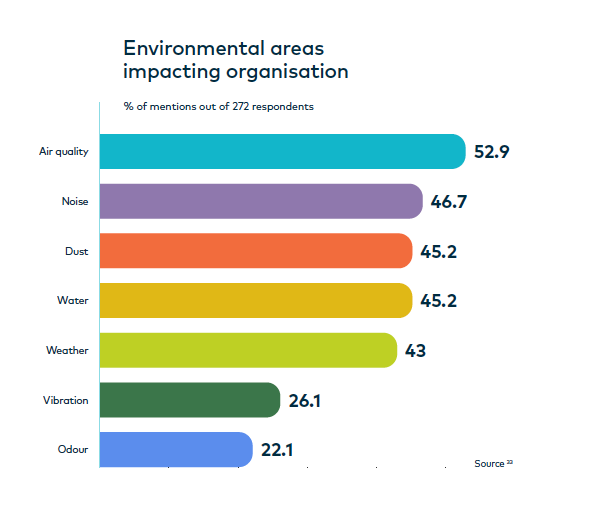A recent report from Frost & Sullivan interviewed 270 managers at mining, wastewater and waste management operations were interviewed.
More than 50% said they have experienced dramatic impacts on their organisation on account of environmental factors over the last 3 years. Furthermore, ‘Air Quality’ ‘Dust’ and ‘Weather’ were listed in the top 5 environment-related factors impacting organisations today.
 Source: 'Environmental Intelligence: Driving growth in a changing climate.' - Frost & Sullivan, 2020
Source: 'Environmental Intelligence: Driving growth in a changing climate.' - Frost & Sullivan, 2020
Furthermore, almost all respondents were also faced with the challenge to continue operating efficiently amid growing urbanisation. Conditions relating specifically to weather are also having a consequential impact on nearby communities by impacting them with air quality, dust or odour emissions.
Today, it’s becoming obvious that ‘prevention is better than cure’. Although industrial operations and municipal authorities have been employing digital solutions for environmental management over the past decade, there’s a growing need to mitigate risk from multiple parameters in real-time (air quality, noise, odour, water), run simulations of environmental conditions and detect potential issues before they occur or impact surrounding communities.
Save your seat: Free webinar on dealing with environmental and weather changes
Dealing with environmental and weather risks at your site? Click here to save your seat at our free webinar on April 14 where we will share 3 examples of Environmental Intelligence solutions to help reduce stoppages and limit downtime at your site.
Lack of comprehensive approach with current digital solutions
Only 11% of total respondents in the report stated they were using digital tools across four or more environmental parameters. However, most respondents plan to implement digital tools over the next two years.
Current digital tools on the market for environmental management focus on the collection, storage and only sometimes, the display of information. Although useful for reporting on issues that have happened in the past, analysis of data is time consuming and difficult for non-subject matter experts. At the end of lengthy investigations on the source of what caused an issue, results are inconclusive, and the opportunities for operational improvement have passed.
There is now an imperative need for industrial operations to movie towards data-centric approaches to optimise operations, implementing automation, and enabling real-time decision-making. Operations that derive value from their data effectively will be able to drive competition and optimise operational efficiency by reducing stoppages and limiting downtime.

Systems that assist operators in deriving value from data to identify potential issues ahead of time will be key critical to operating efficiently in areas with growing populations.
Detecting emission issues early to avoid community impact, reduce stoppages and limit downtime
Almost every industry is now leaning towards smarter data management and predictive insights for the success of their business. For industrial sites and municipal authorities, the ability to simulate operational and control activities to pinpoint the best plans to avoid unwanted emission incidents and to keep noise levels in check.
Interestingly, a high proportion of organisations who saw environmental management as a way to optimise production or boost operational efficiency at their sites were also aware of the concept of ‘Environmental Intelligence’.
Environmental Intelligence is a technology-driven process, that harnesses the power of big data, artificial intelligence, and analytics tools to produce real-time visualisations, predictive modelling, and actionable insights.
Interested in finding out how Environmental Intelligence solutions could drive productivity at your site? Click here to save your seat at our free webinar on April 14.
Source: 'Environmental Intelligence: Driving growth in a changing climate.' - Frost & Sullivan, 2020
.png)
Free webinar: Dealing with environmental and weather risks
Effective air quality, noise, dust and odour management can be the difference between remaining operational, optimising production in challenging circumstances, or shutting down. It's now imperative for industrial operations to utilise high quality real-time predictive data, to make confident decisions and optimise their operational and financial outcomes.
At Envirosuite, we believe that consistent examination and clarity about the causes of environmental issues also improves operational planning and has a direct impact on the financial bottom line.
Join us on 14th April where we will share 3 examples of Environmental Intelligence solutions that deal with environmental and weather risks, enabling you to optimise productivity at your site.
Click here to save your seat.
